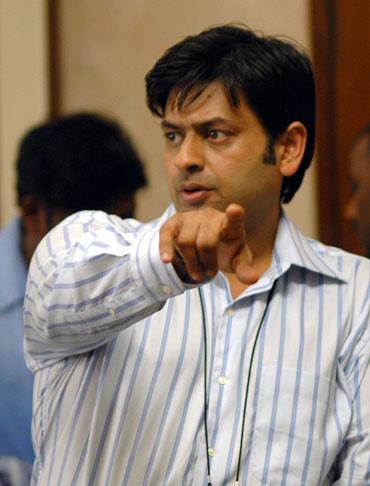
On Saturday night, my cell phone rang at 3 am. I answered it, waking up in a haze. I had just returned from a trip to India, and I felt confused and dislocated.
It was my friend (filmmaker) Dev Benegal calling from Mumbai. He had some sad news to share. Our filmmaker friend Manish Acharya had fallen off a horse in Matheran (a popular hill station near Mumbai) and died as a result of brain haemorrhage.
Tough news to handle and hard to believe this could have happened. Manish was always so full of life, confidence. He was stocky, big built. How could he have fallen off a horse and injured himself so seriously?
Just two days earlier, we were chatting on Twitter. Manish was all praise for French filmmaker Gasper Noe's devastatingly disturbing new film Enter The Void. He had seen the film in New York and, according to his tweet: 'The faces of the audience after were worth the price of admission.'
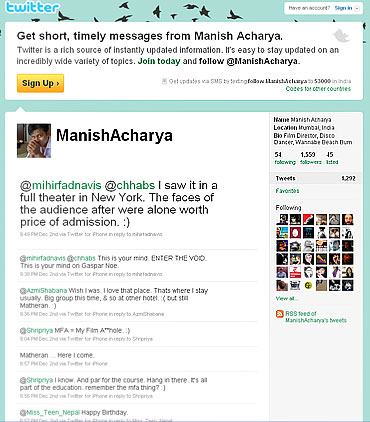
But I could still hear his voice in my head.
Half an hour later I called Nina Paley, an American animator, who cast Manish and me as shadow puppets in her much celebrated film Sita Sings The Blues. Thanks to that film, Manish and my voices have become permanently interconnected.
Then, as I began to leave the message for Nina, I started to cry. I never thought that Manish would make me cry, but this was no ordinary message I was leaving for Nina.
I first met Manish in April 2007 at New York University, at a screening of the only feature film he would direct -- Loins Of Punjab Presents. Manish acted in the film, directed it and also co-wrote the script with a common friend Anuvab Pal.
Anuvab had introduced us and had invited me for the screening. It was a boisterous and a hilarious celebration of all things desi. The film warmly depicted a group of Indian Americans as they prepared for an Indian Idol contest in New Jersey. After the screening, Manish and I decided to meet and talk about the film.
Also read: Super Sardars
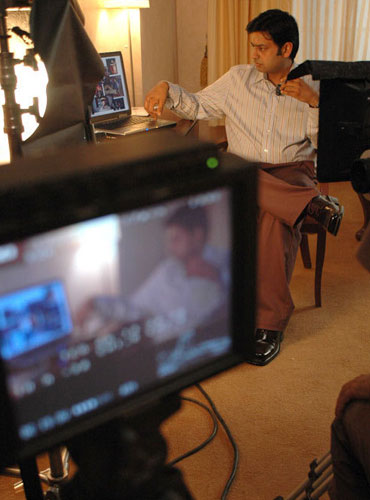
Later in the afternoon we visited a sound recording studio. Nina Paley had invited the two of us and another New Yorker -- Bhavana Nagulapally -- to record a conversation on the Ramayana.
For the next two hours, Nina tossed questions at us and we responded giving our own interpretations of the Hindu text.
Manish was the most knowledgeable about the Ramayana since he would read Amar Chtra Katha comic books to his two young sons. Bhavana was the voice of reason, while I was the funny, clueless one, mixing up names and characters.
That conversation became the basis of the three shadow puppets that narrate and tie up the story of Sita Sings The Blues. Our dialogues were unscripted, improvised and spontaneous. There was a lot of bantering between Manish and I, and that has found its permanent place in the film.
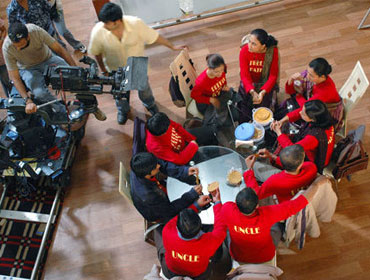
My Saturday with Manish was still on.
We had coffee at a Starbucks and then, in the evening, we were at the opening reception for an Indian film festival at the Museum of Modern Art. That was followed by a Chinese dinner with friends and some visitors from India - including Nandita Das and Uma Da Cunha. And finally Manish and I watched a late night film -- the hilarious British comedy, Hot Fuzz.
I do not think I had ever spent the whole day -- and a very busy day -- with someone I had just met. But Manish and I had really bonded, as if we had known each other for a long time.
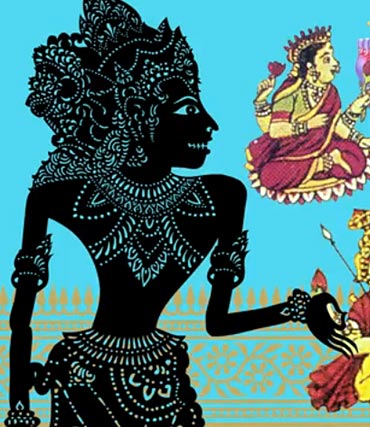
I saw a few more films with him -- at the Tribeca Film Festival in April 2008 where we both attended the New York premiere of Sita; and later we watched Hong Kong director Johnnie To's riveting two films -- Election and Triad Election, shown back-to-back at Manhattan's Film Forum.
Manish lived in Mumbai, but we continued our film conversations -- through e-mails, on Facebook and until this past week on Twitter.
During the Tribeca festival we were interviewed (external link) by the New York-based AVS television station for our roles in Sita.
For the last two days I keep revisiting this video right at 2.47 minutes. Manish was hilarious and animated, and that is how I would always like to remember him.
I last saw him this past summer in New York. He made tea for me in a large apartment he was and his wife Dhruvi were staying in.
We were meeting after a year and it occurred to me that I had gotten used to his voice by watching Sita at many screenings. "You sound just as you do in the film," I said to Manish and he laughed. He then gifted me a DVD of Loins.
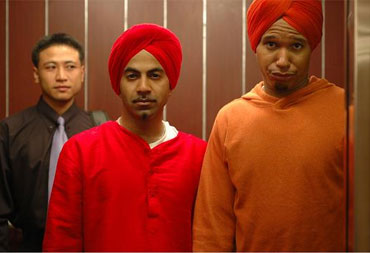
Later, reflecting his wicked sense of humour he sent me the following message on Twitter: 'India's not big enough for the two of us. Or the US needs one of us there to hold down the fort. You decide which one it is.'
Manish was a real funny man, a fine actor (he was actually quite romantic in Loins) and a very talented director. On Twitter he described himself as 'Film Director, Disco Dancer, Wannabe Beach Bum.'
He was in a blissful state of mind before he died. Last Tuesday, this is what he wrote on his Facebook status: 'I'm already loving December!' He died on the third day of December.
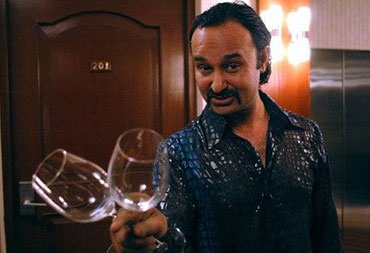
Many of us have lost a good friend, a decent human being. But he would want us to continue our journey.
Each time I see a good film, I will think about how Manish would have reacted to it.
On December 6, I leave for a trip for the University of Indiana, Bloomington where I have to speak at a couple of Sita Sings The Blues-related engagements. Manish will be in my thoughts at all times.
And, in any case, I will once again hear his voice -- the all knowledgeable shadow puppet pointing out to me that I was clueless and wrong.